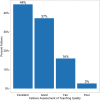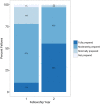Education in Nephrology Fellowship: A Survey-Based Needs Assessment
- PMID: 28428332
- PMCID: PMC5491292
- DOI: 10.1681/ASN.2016101061
Education in Nephrology Fellowship: A Survey-Based Needs Assessment
Abstract
Educational needs assessments for nephrology fellowship training are limited. This study assessed fellows' perceptions of current educational needs and interest in novel modalities that may improve their educational experience and quantified educational resources used by programs and fellows. We distributed a seven-question electronic survey to all United States-based fellows receiving complimentary American Society of Nephrology (ASN) membership at the end of the 2015-2016 academic year in conjunction with the ASN Nephrology Fellows Survey. One third (320 of 863; 37%) of fellows in Accreditation Council for Graduate Medical Education-accredited positions responded. Most respondents rated overall quality of teaching in fellowship as either "good" (37%) or "excellent" (44%), and most (55%) second-year fellows felt "fully prepared" for independent practice. Common educational resources used by fellows included UpToDate, Journal of the American Society of Nephrology/Clinical Journal of the American Society of Nephrology, and Nephrology Self-Assessment Program; others-including ASN's online curricula-were used less often. Fellows indicated interest in additional instruction in several core topics, including home dialysis modalities, ultrasonography, and pathology. Respondents strongly supported interventions to improve pathology instruction and increase time for physiology and clinical review. In conclusion, current nephrology fellows perceive several gaps in training. Innovation in education and training is needed to better prepare future nephrologists for the growing challenges of kidney care.
Keywords: education; fellowship; needs-assessment.
Copyright © 2017 by the American Society of Nephrology.
Figures
References
-
- Murphy D, McCulloch CE, Lin F, Banerjee T, Bragg-Gresham JL, Eberhardt MS, Morgenstern H, Pavkov ME, Saran R, Powe NR, Hsu C-Y; Centers for Disease Control and Prevention Chronic Kidney Disease Surveillance Team : Trends in prevalence of chronic kidney disease in the United States. Ann Intern Med 165: 473–481, 2016 - PMC - PubMed
-
- United States Renal Data System : 2015 USRDS Annual Data Report: Epidemiology of Kidney Disease in the United States, Bethesda, MD, National Institutes of Health, National Institute of Diabetes and Digestive and Kidney Diseases, 2015
-
- Parker MG, Pivert KA, Ibrahim T, Molitoris BA: Recruiting the next generation of nephrologists. Adv Chronic Kidney Dis 20: 326–335, 2013 - PubMed
-
- Kimmel PL, Bosch JP: Effectiveness of renal fellowship training for subsequent clinical practice. Am J Kidney Dis 18: 249–256, 1991 - PubMed
MeSH terms
Grants and funding
LinkOut - more resources
Full Text Sources
Other Literature Sources



